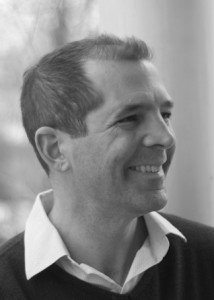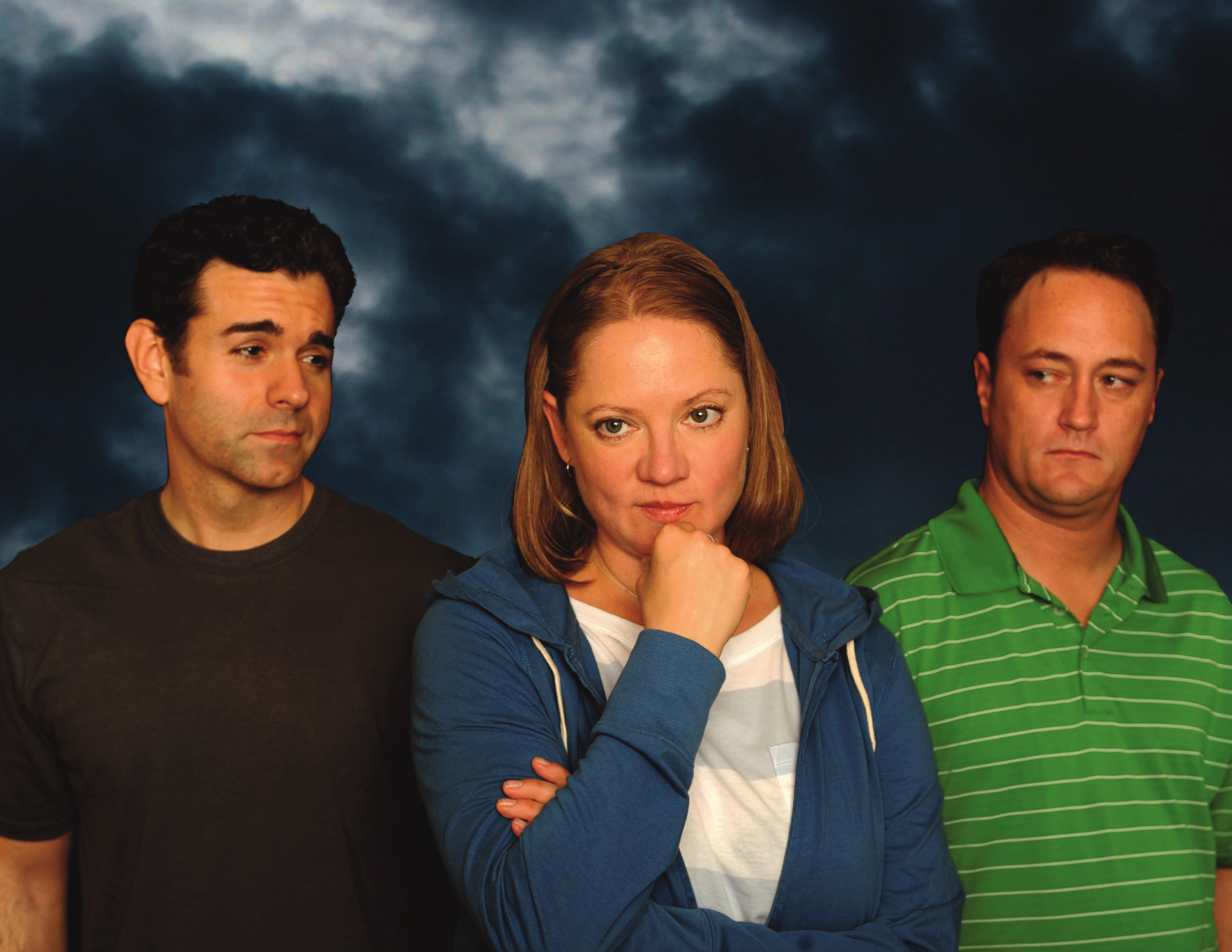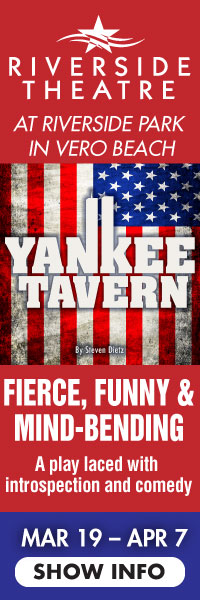By Bill Hirschman
Christopher Demos-Brown’s creative life right now is what a watershed looks like for an emerging American playwright in the early 21st Century.
 Our Lady of Allapattah bows at the Caldwell Theatre in Boca Raton in April. The world premiere of When the Sun Shone Brighter was a highlight of Florida Stage’s last season in Manalapan, winning him the Carbonell Award and Silver Palm Award for best new work last winter.
Our Lady of Allapattah bows at the Caldwell Theatre in Boca Raton in April. The world premiere of When the Sun Shone Brighter was a highlight of Florida Stage’s last season in Manalapan, winning him the Carbonell Award and Silver Palm Award for best new work last winter.
Captiva was supposed to premiere this coming season at Florida Stage. But when the company folded in June, it moved to Zoetic Stage which premieres it this weekend at the Arsht Center.
Zoetic itself is a take-charge-of-your-own-destiny project created in July 2010 by Demos-Brown, his wife Stephanie, director Stuart Meltzer and playwright-actor Michael McKeever plus a company of other actors and directors.
None of which acknowledges the demands of his day job as a civil trial attorney in Miami.
It would appear to be the tipping point for the genial 47-year-old who has become a welcomed insider in South Florida’s theater world in just a handful of years.
“The theater community is truly like a family, both for better and for worse,” he said Saturday during an interview at an Italian restaurant.
“It’s small, intimate and everyone knows each other. The thing I most love about it is that it’s possible to be acquainted with almost everyone, people genuinely care about each other, and they often engage in extraordinary acts of support and generosity for one another.”
Demos-Brown exudes affability with warm brown eyes and a quiet voice that intensifies when talking about theater. But he’s perfectly capable of a lawyer’s incisive assessments: “Tight-knit professional communities tend to ‘self-police’ pretty well, too. If you’re a jerk, word spreads fast.”
Another observation: “The only problem is I think we need a few more theaters to have enough work to keep a critical mass of artists employed full time” – one of the reasons for the creation of Zoetic.
He’s even more clear-eyed about the challenge of getting new works mounted around the United States.
“The skeptic in me says everyone says they want to do new plays, but they don’t take the chance,” Demos-Brown said. “The reality is it’s extremely hard to get things done. Theaters do the same 10 to 15 playwrights, not because they’re good, but because they’re safe bets.”
Several local theaters risk untested plays, but only sporadically. Actors Playhouse premiered Nilo Cruz’s The Color of Desire, Alliance Theatre Lab gave a berth to David Michael Sirois’ Brothers Beckett within the past year and GableStage donates its facility for readings. But the only consistent producers of full-fledged new works are the Caldwell, New Theatre and now Zoetic whose mission is to create work locally that can be exported to the outside world.
That’s the tragedy of Florida Stage’s demise. The theater had built up an expertise at developing new plays. Demos-Brown, whose works evolved there in readings and workshops, mourned the loss of a long-term relationship that had been budding.
Finding slots on local stages is crucial because unlike the old Boston/New Haven tryout model, modern play development usually involves a play being rewritten based on its world premiere production and again between subsequent productions before the playwright is ready to freeze it.
Demos-Brown said, “Until it’s in front of an audience, there are certain things that remain a mystery. When the Sun Shone Brightly, I thought I had it worked out. But I got it in front of an audience, and in places I didn’t expect, I got laughs where there were not meant to be.”
That play told of a charismatic young Cuban-American politician running for office who discovered that his father – an exile leader—may have been murdered for holding moderate stands.
Captiva is a shade less somber, meant to be a smart and stinging contemporary comedy about family, fear and the future. The advertising pitch: “Over the course of a weekend reunion, three siblings come together in the hopes of celebration and re-connection. When their parents join them, rivalry, sex and a hurricane turn the family upside down. Stranded together, they are forced to face each other with honesty and bottles of wine.”
Allapattah is a similar a mix of seriousness and whimsy: Two friends’ religious views clash when they investigate a vision of the Virgin Mary that appears on the side of a strip mall.
Despite the Florida settings, Demos-Brown isn’t trying to speak solely to his neighbors. “I intentionally, consciously use the setting because I’m proud of our region and I want our plays to reflect the area. But it’s not about issues specific to here, no more than the Irish writers were writing about just Irish issues. I want people in London to see these plays.”
But the Florida milieu is always there. That’s what almost sunk When the Sun Shone Brighter. The play was originally considered for production by Actors Playhouse in Coral Gables. But the theater balked after determining that material about the violent dissension in the exile community was too divisive for the theater’s Hispanic audience members.
Putting It Together
Those Florida-centric scripts grew out of a similar creative process: “I have three phases. There’s the falling-in-love phase, the oh-my-God-it’s-a-piece-of-shit phase and the battling-through-it phase.”
The arc from idea to a script ready for rehearsal generally lasts two years unlike his friend McKeever who is famously able to write a play in months.
“”I think I take a lot of time because it takes a long time to pick who you fall in love with, because (that love) has to get your through the piece-of-shit phase. I find a character or a situation that I fall in love with and try to remember that’s why I fell in love with it.”
He needs that inspiration because the middle phase is all discipline and the application of craft. “Ninety percent of it is grinding it out,” he said.
And a lot of rewriting. Captiva went into rehearsal with the 14th draft, six of which had involved significant changes such as reordering scenes.
“I look back at the first two drafts sometimes to see what was the original idea was behind” a section.
Unlike some creative people, his discipline doesn’t extend to a rigid writing schedule of x number of pages every day, in part because everything takes a back seat when he is in trial or when he is paying attention to his daughters. “You can’t multi-task with kids,” he said.
“But when I’m in the thick of it, I write pretty regularly, but it’s not like I must sit down every day. I get up early and do it before kids are awake. I can find the time. I seldom watch TV. I write a lot when I travel…. I think we have a lot more time than we realize.”
The trick is to call on different facets of himself during the process. He cited advice from legal writing expert Bryan Garner: a writer needs to be, at different times, a madman, an architect, a carpenter and a judge.
“You have to allow the madman to get loose early on and lock the judge out of the room.” But later the madman’s inspiration has to be molded by the architect and executed by the carpenter and then edited objectively by the judge.
There aren’t many if any playwriting sewing circles for feedback. So Demos-Brown has taken advantage of a two-year seminar series hosted by the Miami-Dade Department of Cultural Affairs that brings in master playwrights and artistic directors. He also bounces his work off his fellow Zoetic playwright. “McKeever and I give each other notes, come to readings.”
McKeever said of his colleague, “Chris is an incredibly smart writer. His dialogue is always peppered with great insight into the human condition. He’s really very good at showing the audience what’s going on inside the characters, as opposed to what they’re presenting on the outside. When reading his work, I always find myself looking for what’s not being said. He’s also wickedly funny. And this humor, combined with his intelligence, always makes for what I think is the best kind of theater.”
Captiva also benefited from a stint at the Playwright’s Center in Minneapolis, which provided actors and a director as guinea pigs. Demos-Brown had actors read Captiva’s steadily evolving climax in which seven characters come together over 13 pages in what he terms “a verbal freefall… a symphony of discord.” They’d read it aloud, he’d rewrite, they’d read again, he’d rewrite, they’d read for a day and a half.
He has dabbled with short stories, but not a novel because playwriting requires the active participation of other artists to riff off of. “You’re writing a recipe instead of creating a cake.” To determine if a script is effective, you ask, “Are people able to come up with the right flavor?”
He also admires and aspires to an invisibility of technique. “What wows me is someone who has tremendous craft but hides it. They’ll experiment, but (their work is) fundamentally about rich characters that seem to speak effortlessly but they’re speaking carefully-crafted elevated language.”
Among his current playwriting heroes are Bill Cain (Equivocation), Bruce Norris (Clybourne Park), Will Eno (Thom Pain), Tanya Barfield (Bluedoor) and Edward Albee. At the top of the list is Arthur Miller who he said laid the foundation for modern playwriting. “I take down Death of a Salesman once a year and read it.”
Look, I Made A Hat
The Making of the Playwright 2011 is a familiar yet unique journey. His family moved to Miami when he was nine in 1974, which makes him a legitimate contender as a South Floridian. His mother is a former nurse and still works monitoring studies for drug companies. His father is a doctor and the former chairman of Orthopedics at the University of Miami.
(Side note: He was born Chris Brown, but he said adopted the Demos-Brown name because “one, Steph and I hyphenated our daughters’ last names and I want anything I write to bear their names for sentimental reasons and, two, if you Google ‘Chris Brown’ you get the R&B singer who beat up Rihanna.”)
Demos-Brown attended Killian High, then Dartmouth College to receive a bachelor’s degree in Russian Language and Literature in 1986. He later earned his law degree from the University of Miami, and later a master’s degree in international law from Fletcher School at Tufts University and a “diplôme d’études supérieures” from the University of Geneva in international affairs and economics.
None of which sounds like the resume of a playwright. His first theatrical experience was “some musical about Ben Franklin in elementary school,” he said in an interview with Florida Stage’s website. “The first professional production I remember seeing was of My Fair Lady at a dinner theater.” But his real interest in theater didn’t germinate until he was in college where he acted and directed a little.
In fact, he went to Los Angeles after Dartmouth to be an actor. “I did pretty well for about three years until I could no longer play college kids, but was too young to play a young father.” While there he wrote screenplays and paid the bills reading and reviewing scripts.
After five years, he returned home to study law at the University of Miami. While studying, he hooked up with the Mental Floss improv troupe, which he credited as great training because “you learned by being able to fail.”
Inspired by the dramas of Mark Medoff, Caryl Churchill and Lanford Wilson, he began writing plays, producing two that he vows never to take out of the drawer.
Two things kept him plugging away through those early efforts.
First, “I felt for a long time when I saw something contemporary…,” He paused for fear the statement would sound immodest. “… I thought I can write better than that.” He said sheepishly that a playwright needs confidence. “To think that people would want to read it, actors would want to memorize it and people would pay to see it, takes an immense amount of ego.”
Second, “all of my plays have as my starting point something that irritates me or bothers me. Playwriting forces you to examine them with craft and discipline.”
For instance, When the Sun Shone Brighter reflected a lifelong interest in how the Cuban exile community sometimes erupted into violence. Then one day, he read in the Miami Herald about “a woman whose father had been assassinated because his anti-Castro views weren’t sufficiently ardent. She lost her father when she was very young and never knew who killed him. … It gave me a clue as to how to make this a very personal story,” he told the Florida Stage website.
In the meantime, he developed a day job as a civil trial attorney, primarily representing manufacturing firms such as those making aviation parts.
He said the synergy between the jobs is not, as many people suppose, that the opportunity to speak to a jury dovetails with the desire to act.
“It’s that trials are drama. Trials are about telling stories. You can’t just give facts to a jury; you have to give them a narrative” to understand how each piece of evidence fits in a whole. “I love writing closing arguments.”
Also, “being a trial lawyer teaches a discipline. When you write legal briefs, you have to weigh every word, every thought.”
That discipline is currently being applied to two works in the hopper. He’s about two-thirds through the first draft of Wrongful Death, about a jaded personal-injury lawyer battling to land the case of her life.
If he has it ready in time for Zoetic’s next season, Demos-Brown’s winning streak may go into extra innings.
Captiva runs Nov. 3-20, produced by Zoetic Stage and co-presented by the Adrienne Arsht Center in the Carnival Studio Theatre, 1300 Biscayne Blvd., Miami. Performances 7:30 p.m. Thursday-Saturday, 4 p.m. Sunday, 2 p.m. Saturday Nov. 5; Tickets are $40 at arshtcenter.org or call (305) 949-6722.
For video of Demo-Brown describing Captiva, click here.
For video of an early production meeting, click here.









 A PaperStreet Web Design
A PaperStreet Web Design

Pingback: Zoetic Stage’s Captiva is Incisive Look Inside the American Family | Florida Theater On Stage